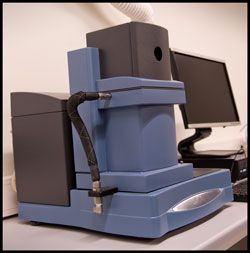Rheology/Dynamic Mechanical Analyses
Dynamic Mechanical Analysis (DMA) is a technique used to measure the mechanical properties of a wide range of materials.
Many materials, including in particular polymers and soft matter materials, behave both like an elastic solid and a viscous fluid - they are viscoelastic. The DMA measures viscoelastic properties using either transient or dynamic oscillatory tests. Transient tests include creep and stress relaxation. In creep, a stress is applied to the sample and held constant while deformation is measured vs. time.

The rheological parameters can be measured as a function of temperature, time or frequency, and strain-amplitude.
After some time, the stress is removed and the recovery is measured. In stress relaxation, a deformation is applied to the sample and held constant, and the degradation of the stress required to maintain the deformation is measured versus time.
The most common test is the dynamic oscillatory test, where a sinusoidal stress or strain is applied to the material and a resultant sinusoidal strain or stress is measured.
With the modulus equals stress/strain, the complex modulus, E*, can be calculated, giving the storage modulus, E’, and loss modulus, E’’. The storage modulus (E’) is the elastic component and related to the sample’s stiffness. The loss modulus (E’’) is the viscous component and is related to the sample’s ability to dissipate mechanical energy through molecular motion.
The instrument for dynamic mechanical analysis is a Q800 from TA-instrument.
- The instrument is available in three fixtures: Shear-sandwich, tension and dual cantilever.
- Temperature range -150°C-400°C, frequency range 0.01-200Hz.
- The instrument have been modified for possibility for in-situ scattering experiments using neutron beam.
For further information, contact Ass. prof. Jacob Kirkensgaard jjkk@nbi.ku.dk
